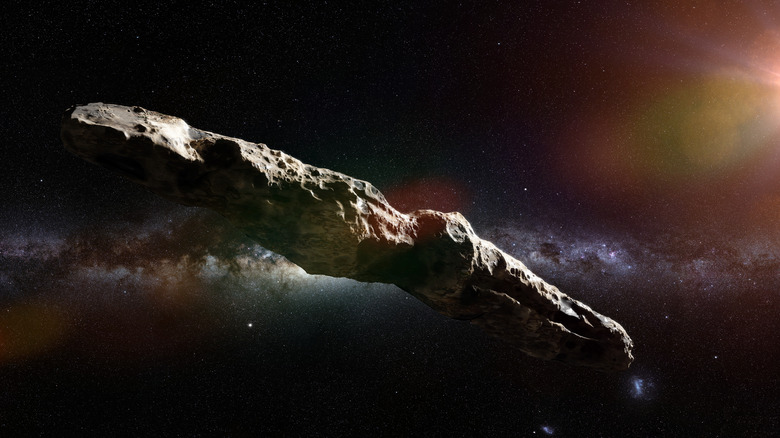Scientists Say They May Have Found An Alien Probe – Yes, Really
We'll be honest: Alien probes are not something we thought we'd ever cover on Sciencing. But it's 2018 and apparently anything can happen, so here we are.
This week, a group of astronomers – from Harvard, not "I Want To Believe" University – published a paper on a strange, cigar-like object they found in our solar system late last year. Dubbed Oumuamua (which is Hawaiian for "a messenger that reaches out from the distant past") it's the first object of its type discovered in space.
And scientists are flummoxed. The research group has speculated it may have an artificial origin – as in, created by another civilization – but that's not the only explanation. And some experts aren't so sure it is a new type of object in the first place.
So how can you make sense of this strange interstellar phenomenon? Here's what you need to know.
First Off, How'd They Find Oumuamua?
First Off, How'd They Find Oumuamua?
The Harvard astronomers first discovered Oumuamua last October. It went flying past the sun, so fast that astronomers knew it couldn't have originated in our solar system. And, get this: After passing the sun, it sped up. Its travel path and speed is strange, since it can't explained by the gravitational pull of the sun or the planets, the researchers explain.
And Oumuamua looks different than standard comets or asteroids. For one thing, it's thin and long – about 400 meters (about a quarter-mile) long, and 40 m (or about 131 feet) wide. Oumuamua is also made of some type of carbon-based substance, instead of metal or ice.
What Do the Experts Say About It?
What Do the Experts Say About It?
Because Oumuamua is such a new and surprising discovery, astronomers are still trying to make sense of it. And there are a few theories about where it came from and what could explain its strange travel pattern.
One potential explanation is that the sun's radiation is responsible for its speed. The sun constantly emits radiation that can apply force to nearby objects (kind of like how wind can propel a sailboat). Because Oumuamua is such an odd shape, the force of that radiation might work differently than on, say, a comet, triggering that strange acceleration. Alternatively, it could be emitting gas or debris, which would increase its speed.
There are a few theories to explain Oumuamua's origin, too. Some scientists speculate that it could be a shard of an exploded planet. And while the Harvard researchers believe it's a new class of objects, it could potentially be just a strangely-shaped comet or asteroid.
Then, of course, there's the alien theory. As the Harvard researchers wrote, "Alternatively, a more exotic scenario is that 'Oumuamua may be a fully operational probe sent intentionally to Earth vicinity by an alien civilization.'"
So, Are Aliens Real?
So, Are Aliens Real?
We still don't know! A group of scientists published a paper of statistical tests earlier this year, and concluded – based on our current knowledge of space – that we're 39 to 85 percent likely to be the sole civilization in the observable universe. We're also between 53 and 99.6 percent likely to be alone in the galaxy. If we find more evidence of alien life, those numbers would change. But as it stands, we are more likely than not to be the sole civilization, at least in our galaxy.
Whether Oumuamua is really proof of alien life remains to be seen. But no matter where it came from, finding the first interstellar object is still pretty exciting. Its unique shape and distinct travel path will help astronomers learn more about our solar system, and the universe as a whole.
And if you're really into the idea of aliens? Well, there's always the X-Files.
References
- Vox: Why haven't we found aliens yet?
- Vox: Oumuamua is the only interstellar object we've ever seen in our solar system. What is it?
- The Verge: Why we shouldn't cry 'aliens' about that interstellar space rock just yet
- The Guardian: Do scientists really think 'Oumuamua is an alien spaceship?
- Physics World: Is interstellar object 'Oumuamua an alien space probe?
Cite This Article
MLA
Tremblay, Sylvie. "Scientists Say They May Have Found An Alien Probe – Yes, Really" sciencing.com, https://www.sciencing.com/scientists-say-they-may-have-found-an-alien-probe-yes-really-13715773/. 8 November 2018.
APA
Tremblay, Sylvie. (2018, November 8). Scientists Say They May Have Found An Alien Probe – Yes, Really. sciencing.com. Retrieved from https://www.sciencing.com/scientists-say-they-may-have-found-an-alien-probe-yes-really-13715773/
Chicago
Tremblay, Sylvie. Scientists Say They May Have Found An Alien Probe – Yes, Really last modified August 30, 2022. https://www.sciencing.com/scientists-say-they-may-have-found-an-alien-probe-yes-really-13715773/
